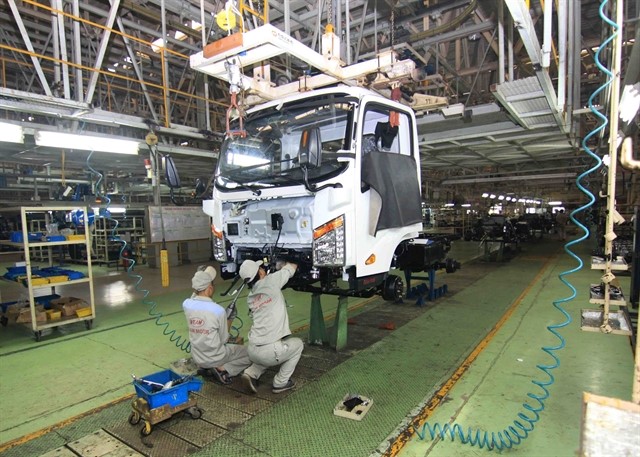Pent-up demand is poised to fuel revenue growth of the automotive industry in the last quarter.

Pent up demand is due to push up car sales in the final months of the year, according to experts.
While the third-quarter revenues of the car industry may have suffered as customers put off buying decisions, in anticipation of possible incentives, pent-up demand is poised to fuel revenue growth in the last quarter, according to SSI Research.
In May, the Ministry of Finance (MoF) introduced measures to support the domestic car industry, extending special tax deadlines and cutting registration fees by 50 per cent for locally-made cars.
Despite prior approval, on August 15, the Government Office issued Notice 384/TB-VPCP on registration fee reductions. According to the notice, the Deputy Prime Ministers and the Standing Committee agreed in favour of a 50 per cent reduction in registration fees for locally manufactured and assembled vehicles over a three-month span.
SSI Research expected that consumers may buy cars post the seventh lunar month due to dealers offering full registration fee waivers, bypassing the need to wait for the policy change.
Data from the Việt Nam Automobile Manufacturers Association (VAMA) showed a 17 per cent increase in car sales in July compared to the same period last year, and a nine per cent rise from the previous quarter, driven by substantial discounts offered by car dealers.
Despite this, SSI Research believes that the third-quarter revenue of the automotive industry in 2024 will still be affected, as consumers postpone car purchases to await incentives. They were also hesitant to make high-value acquisitions during the unfavourable month (the seventh lunar month).
However, in the fourth quarter of 2024, accumulated demand is expected to be the catalyst for revenue growth.
As a result, car sales for companies like Toyota, Honda and Ford Việt Nam are expected to surpass projections in the latter half of 2024.
As these companies affiliate with the Việt Nam Engine and Agricultural Machinery Corporation (VEAM), VEAM stands to benefit significantly from its stake in these entities. Currently, VEAM holds a 20 per cent share in Toyota Việt Nam, 30 per cent in Honda Việt Nam and 25 per cent in Ford Việt Nam.
In the second quarter, VEAM disclosed that its consolidated revenue and profit after tax reached over VNĐ1 trillion (US$41 million) and VNĐ1.8 trillion, respectively. The figures were up five per cent year-on-year and one per cent, respectively.
The bulk of the company's profits derived from interest on savings deposits and earnings from joint ventures with Honda Việt Nam, Toyota Việt Nam and Ford Việt Nam.
According to SSI Research, although revenue figures are in line with expectations, profits after tax have exceeded forecasts by more than ten per cent, driven by robust export activities from Honda Việt Nam.
Profit from affiliates amounts to around VNĐ1.63 trillion, up 3.6 per cent year-on-year and 31 per cent quarter-on-quarter, reflecting a rebound in car sales.
Given the uptick in both vehicle sales and profits from affiliated companies surpassing expectations in the second quarter of 2024, the analytical team of SSI Research forecasts that VEAM's domestic car and motorcycle sales in 2024 will rise by nine per cent and two per cent, respectively, from last year.
Given additional supportive factors like recovering consumer demand and appealing estimated dividend rates of 11 per cent and 10 per cent for VEAM in 2024 and 2025, SSI Research maintains its outlook for VEAM's total revenue and consolidated profit after tax at VNĐ3.8 trillion and VNĐ6.54 trillion, up 0.5 per cent on-year and 4.4 per cent, respectively.
Looking ahead to 2025, SSI Research expects that VEAM's gross revenue will remain above VNĐ3.8 trillion, while the combined profit after tax could potentially reach VNĐ6.7 trillion, a one and a two per cent increase, respectively, compared to 2024.
These estimates hinge on the expectation of higher deposit interest rates and a continued revival in car sales.
In the long-term, SSI Research envisions that the earnings from the motorcycle and car joint venture sector will witness compound annual growth rates (CAGRs) of 1.6 per cent and 4.8 per cent in 2024 - 2028.
Consequently, dividends for VEAM are predicted to dip to their lowest point in 2025 before progressively rising until 2028. — VNS
- Tags
- Local car makers





